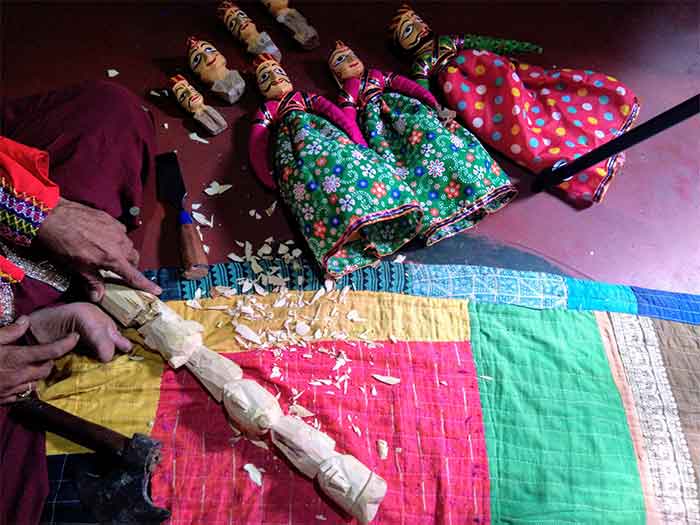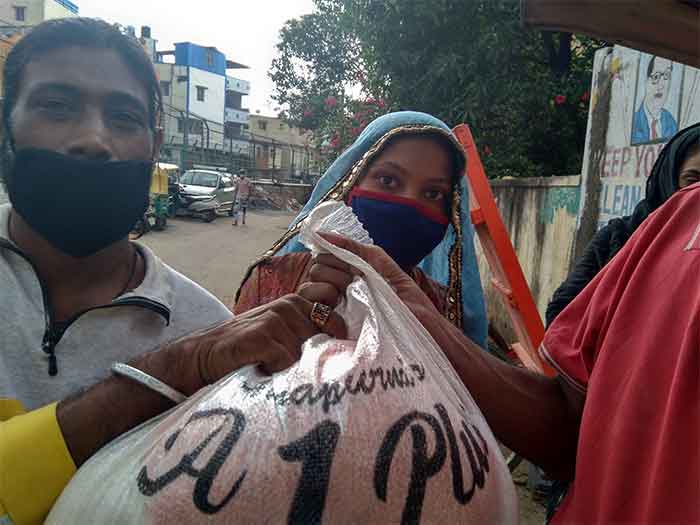
As the Covid-19 lockdown kicked in March, Bangalore and most other cities in India witnessed an exodus of migrant workers returning to their homes in northern and eastern India, by every conceivable means including by cycle and by walking, with women carrying their small children.
But there were some people who could not even leave, because they were not migrant labourers but the traditional, partly itinerant folk artists from Rajasthan, who are found in most cities, enlivening the weddings and other festive occasions with their dhols (traditional drums), their puppet shows, stilt walking.
“We have been doing this for ages, maybe going back seven or eight generations. We are the Bhatt community, and are found all over the country playing drums, making puppets and holding shows, and fashioning colourful traditional toys from natural products like hay and cotton, and brightly decorating them with zari, beads, coloured threads, etc.”, says Praveen*, who has been travelling to Bangalore every year for the last twenty years.
“We travel to the cities from our villages just before the Ganesh festival, and stay on for the Navratri, Diwali and wedding seasons, for several months. We are hired to provide the music and the festive atmosphere in most North Indian weddings and children’s birthday parties,” says Jaggu, a talented drummer.
“There are forty or fifty families from our community working here. Every year we come down for a few months, rent a place and return after the season is over. We are from Ajmer district in Rajasthan”, says Naresh, who carves and paints the most beautiful puppets from mango or jackfruit wood. His wife Seeta bai hand-stitches the body of the puppets and dresses them in traditional Rajasthani outfits.
But usually the women are not directly involved in the work.
The extended lockdown at the very start of the wedding season meant that they got no work. As the lockdown went on and on, their already slim cash reserves were used up for food and rents. By June, things got desperate. There was no food, and most of them were denied rations by the locals because they didn’t have adhaar cards or local Voter Ids.
“Our adhaar cards, voter ids are from Delhi or Rajasthan. So they didn’t give us rations, saying it was only for the local people”, says another of the men, Ramesh Chacha, who makes decorative items like horses, camels, and wall hangings for sale in the local market area. He too suffered as all the markets were closed.
Jivan, who carves figurines out of wood, also selling them on the pavements in the Shivajinagar market, has four small children. His wife Reena says, “We had no option but to beg at traffic intersections because there was no work for the men. We couldn’t even do domestic work as no one would allow us to enter any home due to the corona virus. But those who saw us begging used to ask, ‘Why can’t you work?’ But where was the work?”
It was at one such intersection that we spotted them, new faces, with the distinctive lehnga – choli-dupatta, carrying small babies and asking for alms as traffic ebbed and flowed. We stopped to find out who they were, and why they were begging, because they didn’t seem to be the sort of people used to begging. They started to talk, and their tales of woe poured out : hunger, no rent, no money for necessities, no work, no possibility of any earnings, or even returning to their hometowns, because there was nothing there either, and in any case there were no trains running.

They invited us to their homes, small one-room places in tumble-down old houses in the heart of the market areas in the centre of the town, but we were warmly welcomes, and seated on the floor on hand-made rugs, to hear them tell their stories. We wanted to make a video and share it to news outlets to highlight their situation. As we left, one of us asked, pointing to the patchwork rugs we were sitting on, “Did you make this?” “Yes”, said Pushpa bai. Several other women present said, “Yes, we make these for our use at home. Sometimes when a baby is due, we make a small one for the baby.”
“If you make these for sale, I think you can find that people will buy”, we said. “Oh, no, who will buy them?” they chorused. We insisted that we could find buyers, and this would give them an income for their family’s needs.
And so began a small effort to enable the women to make the patchwork rugs – called gudris – from tailor’s scraps, sewn together, mostly by hand, and then joined and made into patchwork rugs layered inside with cloth. They are not ‘razais’ or quilts, which are made with cotton batting providing the warmth and the lightweight texture. These are rugged products and are built to last for years. Starting small, we encouraged even the younger women to start making the rugs, and spread the word to family and friends, and community groups. Slowly the word spread and now we have about eight to ten women regularly engaged in making these rugs at home. In families with more than one women, they work collaboratively to collect, arrange, sew and finish the rugs together and so find it easier to make the rugs in a shorter time. It takes two women working together three days to make one patchwork rug. They also have to source, trim, arrange, and sew the patches together.

In these times of lockdown, there are less clothes being sewn as hardly anyone goes out and even weddings and festive occasions are celebrated at home in a simple manner, so tailors, designers, embroiderers, etc are all underemployed, so it’s a challenge to source good quality tailor’s scraps. But these women soldier on, and produce one or two rugs a week.
We have taken up the challenge of providing them with rations so that they can focus on the work without having to worry about where their next meal would come from, as they try to patch their livelihoods together, one stitch at a time.
(*Names changed to protect their identities)
Cynthia Stephen is a social activist
If interested in purchasing a rug or wish to donate for their rations, please write to [email protected]
SIGN UP FOR COUNTERCURRENTS DAILY NEWSLETTER














































